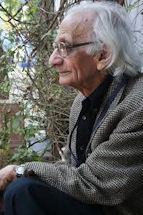|
Un silence torride. On se croirait sous un chapiteau d'un bleu
indécis. Que le moindre geste, le moindre bruit, la moindre angoisse
risquerait d'arracher, ou de déchirer, ou d'anéantir. Ou en présence
de quelque djinn endormi. Qui aurait provisoirement transformé par
un tour de magie toute la qasba en cimetière abandonné.
Je suis planté à l'orée d'une ruelle
fantomatique qui donne sur le bazar. Les petites briques inégales
qui bordent la ruelle comme deux rangées de dents dégorgent une
chaleur torride. Le ciel est un altiplano aride, le bazar un visage
éteint de vieillarde égrotante. Un chien noir, accroché à mes pas,
me regarde obstinément avec ses yeux soumis qui m'envoient de
lugubres messages - moi aussi je suis un vagabond, tu ne me connais
pas mais moi je te connais, et même je sais dans quelle galère tu
vas t'embarquer, pourquoi tu ne m’emmènes pas avec toi à Lahore ?
Toi non plus tu ne peux pas trouver la paix, même sous ce soleil de
plomb !
Je m'envole vers le ciel, histoire
d'échapper au regard insistant de cet ami trop bavard ; dans le
ciel, il y a une buse qui plane, parfaitement immobile, aussi peu
concernée par notre présence que par sa propre existence, embarquant
le ciel tout entier sur ses ailes. Le chien, fâché de mon
indifférence, remue les oreilles et revient sur ses pas dans la
ruelle, comme s'il allait se plaindre de moi à sa mère. Tout à coup
un corbeau, parachuté de nulle part, vient déchirer le silence – ne
t'inquiète pas! Ne t'inquiète pas! Je me souviens d'un vieux
proverbe oublié cher à ma bonne Grand-mère - quand il a vu le soleil
dans ciel de mousson, le roi Bharat a fondu en larmes ! La première
fois que j'avais entendu ça je n'y avais rien compris, avant qu'on
m'explique que le roi pensait à son frère Ram. Le corbeau continue -
ce soleil, il n'a rien à voir avec la saison de la mousson. Je
trépigne pour le faire partir et je m'engage dans le bazar. Comme
poussé par la peur que, si je ne bouge pas, le chien revienne en
remuant les oreilles et que le corbeau vienne se percher sur ma
tête.
Bientôt je vais partir pour Lahore, Aslam
pour Goujarat, Hardayal et Jita pour Amritsar. Il n'y a que Keshav
qui va rester. Il a échoué pour la deuxième fois à l'examen de fin
d'études. Il dit qu'il ne veut plus s'y présenter. Faites des
études, vous autres, dit-il, moi je resterai à glander ici. Depuis
qu'on a eu les résultats, il n'arrête pas de rire, à ce que dit sa
mère. Si on lui demande pourquoi, il répond - vous allez aussi
m'empêcher de rire ? Je suis collé, d'accord, et après ? Vous
autres, allez-y, au Collège, moi je reste ici, je passerai toute ma
vie avec ma mère, moi le petit trésor à sa maman, l'épileptique, le
maboul ! Depuis qu'on a eu les résultats, c'est une vraie langue de
vipère et, d'après Aslam, il a complètement perdu la boule. Il est
en permanence à cran, contre nous et contre lui-même aussi, et il
nous bombarde de piques. Mais on finit par avoir tous si peur de lui
qu'on hésite à parler devant lui. Et lui il se plaint que plus
personne ne lui parle franchement à présent - ça m'est égal, vous
autres, allez faire des études, moi je monterai la garde dans la
qasba, je battrai le pavé, avec Cétadir. Quand vous rentrerez
pour les vacances, vous me trouverez à l'octroi, en train de compter
les mouches. Depuis qu'il s'est mis à critiquer tout le monde, y
compris lui-même, on n'ose même plus se regarder en face nous non
plus, sans parler de le regarder lui en face. Aslam dit qu'il faut
s'efforcer de ne pas l'énerver, sinon il risque de faire une crise.
Maman n'arrête pas de me répéter que si je
ne fais pas attention au soleil, qui est aussi mauvais pour la voûte
plantaire que pour la voûte palatale, moi aussi je deviendrai fou
comme Keshav. Elle a décidé qu'il a perdu la tête. Et ça me met dans
une telle rage de la voir s'en réjouir qu'il me prend des envies de
me promener tout le temps tête nue et pieds nus au grand soleil pour
qu'il me grille le palais et la plante des pieds et que je me mette
moi aussi à débloquer comme Keshav. C'est d'ailleurs peut-être dans
cette intention que je suis sorti faire mon petit tour aujourd'hui.
Krishna Baldev VAID - Requiem pour un autre
temps (pages 141-143) - © Editions Infolio - 2012
Traduction Annie Montaut
|




